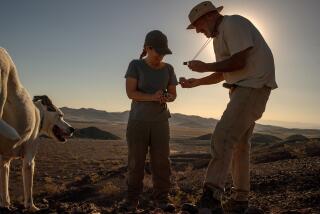Critics Perceive Clash of Motives in Archeology Contract Work
- Share via
State and federal laws requiring scientific inspection of building sites that may contain valuable relics have taken many archeologists out of universities and museums and into the business world.
The result is a sometimes bitter debate over professional standards between academic archeologists and their business-oriented, fee-charging counterparts.
At first, requiring developers to hire archeologists “seemed like a great thing,” said Donald Keith, an archeologist with the Institute for Nautical Archeology, affiliated with Texas A & M University.
Keith said “that seemingly simple arrangement,” however, has divided archeologists into scientists and what he termed “contract chasers.”
Some See Conflicts
Keith and others in his camp argue that contract archeologists are subject to conflicts of interests. They say an archeologist who surveys a construction site for a commercial developer, for instance, may feel pressured to minimize valuable findings so that further archeological excavation will not cause expensive delays in construction.
Others in the field disagree, saying contract archeologists perform an important service, rescuing important artifacts from under office buildings and parking lots. The legislative requirements also pump dollars into a field that has traditionally relied on funding by governments and nonprofit foundations, they say.
“In Los Angeles, development is so extensive that we are essentially going to lose the archeological records unless we have archeologists willing to collect information,” said Mark Raab, director of the Center for Public Archeology at California State University, Northridge. He is also president of the Society for California Archeology.
Pragmatic Line
Raab, who does contract work through the Northridge center, said university-based organizations are more scientific and research-oriented than their business counterparts. The university groups must walk a pragmatic line between academic purists and profit-making companies, he said.
Contract archeologists, who prefer to be known as “cultural resource managers,” concede that they sometimes are torn between the demands of the developer and their science. Often they are called upon to scrub away centuries of dirt with toothbrushes and precisely map locations of ancient bones as construction crews impatiently wait to crank up bulldozers.
“If we find something significant, we have to try to stop” the construction, said Nancy A. Whitney-Desautels, the archeologist who headed the excavation that uncovered the Lost Village of Encino. Desautels said she thinks contract archeology gradually is becoming more accepted in academic circles.
One university-based archeologist well-known in the field said he thinks there is a need for academics to overcome their biases. “A lot of contract archeologists feel as if there’s a stigma on them, that they’re put into a second-class-citizen role,” said Ian Brown, associate curator and acting director of Harvard’s Peabody Museum. “But there is a need for it, to salvage information. A lot of decent scholars are doing contract archeology.”
Far-Reaching Laws
California is among several states that have the most far-reaching laws, most of them passed during the preservation-conscious 1960s and 1970s. In some cases, the laws may even require private home builders to undertake archeological surveys before construction if public officials believe artifacts may be disturbed, Raab said.
The legislation created a large demand for contract archeologists, especially in development-heavy California, professionals in the field said. Contract archeologists estimate that about 300 firms are in the business nationwide, 50 of them based at universities. About 40 are in California.
Of the about 5,000 professional archeologists in the United States today, 75% work in contract archeology, Raab said. Those in private business range from “mom-and-pop” businesses operating from garages to sophisticated archeological and engineering firms that handle million-dollar contracts and employ hundreds of skilled workers.
Contract archeologists are in large demand by private developers and federal agencies undertaking construction. In 1982, federal agencies spent $130 million on archeology, Raab said. Private developers account for millions more. The lost village excavation alone cost $1.7 million.
Value of Contracts
Most archeological contracts range from $1,000 to $5,000, archeologists said, but there are much larger contracts. Ruthann Knudson, an archeologist for Woodward-Clyde Consultants Inc., said she has worked on an $8-million project that spanned seven years.
Hester Davis, an archeologist affiliated with the University of Arkansas, helped draft a 1974 federal law that set standards for archeological research at construction sites. She said it is too early to tell what effect contract archeology will have on the archeological profession.
“I don’t think anyone has a real handle . . . on whether private contractors do good or bad jobs,” she said.
More to Read
Sign up for Essential California
The most important California stories and recommendations in your inbox every morning.
You may occasionally receive promotional content from the Los Angeles Times.













